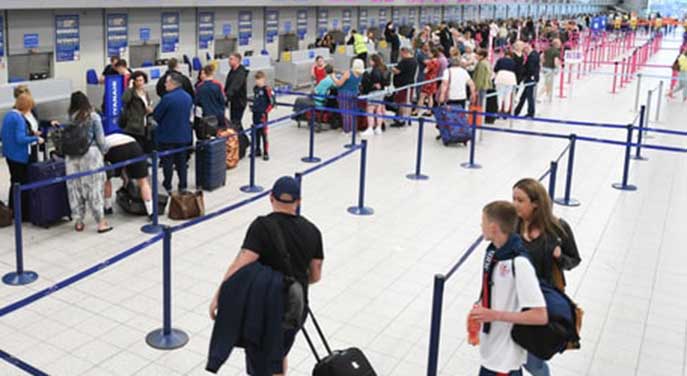
Canada’s federal travel mandates are so oppressive that even apolitical international agencies have stepped up to condemn them.
The International Air Transport Association has added its voice to the official Opposition Conservative Party, citizens, airline staff fired for their vaccination status, and grounded and disgruntled air passengers who want to fly hassle-free.
IATA regional vice-president for the Americas, Peter Cerda, says vaccine requirements, random testing, the ArriveCAN app, and mandatory submissions of health information should end now.
“It is clear that people want to travel. We can therefore ill afford to have passengers subjected to unacceptable wait times both on arrival in the country or on departure,” Cerda said.
“The relevant authorities must urgently consider removing the last remaining travel-related COVID-19 restrictions and work with the industry on policies and processes which will allow passengers to pass through airports with no undue delay.”
| RELATED CONTENT |
| We drastically overreacted to the COVID-19 pandemic By Lee Harding |
| The allegations for invoking the Emergencies Act were baseless By Ryan Alford |
| Trudeau has irreparably damaged our country By Brian Giesbrecht |
The situation is “untenable” according to IATA spokesman Markus Ruediger. “It’s pretty dire. It’s delays, delays, delays,” said Ruediger. He says, not surprisingly, the delays are impacting travel in other countries, too. It’s not hard to imagine that long processing times in Canada mean delays elsewhere, or eventually less scheduled flights to Canada.
The Canadian Airports Council has also complained that government mandates quadrupled processing time for air travellers. Conservative critic Melissa Lantsman tabled a motion in Parliament to have the restrictions end, but 115 Conservative MPs and two others were overruled by 202 other MPs who support the status quo.
Liberal Transport Minister Omar Alghabra claims the delays aren’t due to the government but the overwhelming demand for travel.
“We will always be supporting our tourism sector,” said Alghabra. “We are all excited about the travel season coming up. Canadians are travelling. We are doing everything we can to address these lineups. We are working with airports. We are working with the airline sector.”
Does “working” with airports and the airline sector mean doing what these agencies are asking for or everything but?
Unvaccinated Canadians, who hadn’t been grounded since misbehaving as a child, have since been grounded by their government. Their only sin was to refuse vaccines that didn’t prevent sickness for many who had three injections.
At least one thing is taking off – participation in the Canadian organization Free 2 Fly. It has gained more than 42,000 members, all hoping their collective voice gets enough volume to make the federal government drop the mandates. This list includes almost 3,000 Canadian aviation professionals, some of whom served in Canada’s military – and some of whom are vaccinated.
Unfortunately, some former Canadian military pilots lost their jobs and ability to fly domestically for their unvaccinated status. How ironic for someone to fight for Canadians’ freedom abroad only to lose it at home at the hands of their government – and to be denied employment insurance for their job loss to boot.
Deputy Prime Minister Chrystia Freeland is doing double duty as a member of the board of trustees on the WorFsmold Economic Forum. Perhaps that’s why Canada is the only country besides the Netherlands to participate in the WEF’s Known Traveller Digital Identity (KTDI) pilot program. Airports in Montreal and Toronto are also participating. Of course, the federal government has a $500 million equity stake in Air Canada now as part of its $5.9-billion COVID-era government rescue.
According to the project’s website, “KTDI enables more secure and more seamless travel that benefits both travellers and the travel industry.” The idea is that through accessing “verifiable claims of a traveller’s identity,” authorities can “optimize passenger processing and reduce risk.” It’s a way for “a global consortium of individuals, governments, authorities and the travel industry to enhance security in world travel.”
KTDI says people travellers can “collect digital attestations of their personal data” and decide what data to share and when. “The more attestations a traveller accumulates and shares, the better consortium partners, governments and other parties can provide a smooth and safe travel experience.”
As Dr. Phil might say, “And how’s that working out for ya?”
Smooth travel hasn’t arrived, but it does seem like a great way to collect social credit scores. Sure, people can refuse to participate – but will they be able to travel?
In 2010, the Rockefeller Foundation and Global Business Network co-sponsored “Scenarios for the Future of Technology and International Development.” Here, the “Lock Step” scenario envisioned a worldwide pandemic that crippled tourism and supply chains.
“During the pandemic, national leaders around the world flexed their authority and imposed airtight rules and restrictions, from the mandatory wearing of face masks to body-temperature checks. … Even after the pandemic faded, this more authoritarian control and oversight of citizens and their activities stuck and even intensified.”
And here we are. Control remains in Canada when its supposed reasons have ended. It’s high time people were free to fly.
Lee Harding is a research fellow for the Frontier Centre for Public Policy.
Lee is a Troy Media Thought Leader. For interview requests, click here.
The opinions expressed by our columnists and contributors are theirs alone and do not inherently or expressly reflect the views of our publication.
© Troy Media
Troy Media is an editorial content provider to media outlets and its own hosted community news outlets across Canada.

